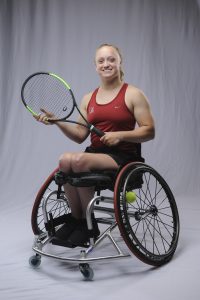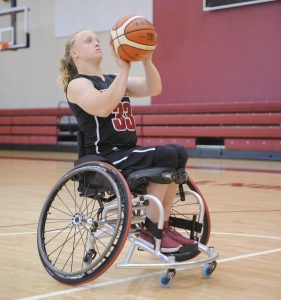By David Miller

Avery Downing was a “non-traditional recruit” for The University of Alabama’s Adapted Athletics program.
She hadn’t played wheelchair basketball or wheelchair tennis prior to enrolling at UA in August 2017, but she was keen to compete again, either recreationally or competitively. Downing spent nearly five years without a sport after suffering a spinal cord injury at age 13.
A former level 9 gymnast, she was injured during a fall while practicing uneven bars, ending her dream of college competition.
She kayaked with friends and pondered joining a men’s wheelchair basketball league in her native Memphis, but it couldn’t match the thrill of competition and fun she’d experienced since she began gymnastics at age 4.
“One of the hardest things was not doing gymnastics anymore because it was so much of my identity, and all of my teammates were doing it,” Downing said. “It got better with time, and, as my teammates grew up and graduated and started doing different things, I felt better about it.”
The summer before Downing’s senior year at Houston High School, she began researching collegiate adapted sports programs. The search led her to UA, home to 11 national championships in wheelchair basketball and wheelchair tennis. But sports were one of several considerations for Downing, a UA Presidential Scholar majoring in English. Her father, Philip, is an Alabama fan, and several high school classmates had enrolled at UA.
Recruiting
Downing contacted Evan Enquist, UA wheelchair tennis coach, during that summer. Her initial goal was simply to be involved in sports, whether competitive or non-competitive.
“I saw there was a wheelchair tennis community clinic and thought I could go to that,” Downing said. “I called [Enquist] to make sure it was going on, and he was excited to meet me. I had that one conversation. Then, I came here, moved in, and it was the same weekend they were hosting their wheelchair tennis tournament. My mom and I went to see the tournament, found Evan, and talked to him about another meeting to try out chairs.”
Downing’s meeting with Enquist led to discussions with Dr. Brent Hardin, director of UA Adapted Athletics and the women’s wheelchair basketball coach. They convinced her to try basketball, too, as the team was seeking to fill out its roster.
“She was kind of a non-traditional recruit in the sense that she searched us out,” Enquist said. “But, she fit the profile of a great potential athlete: a great student, great attitude and already pretty fit.”

Though UA recruits top-tier adapted athletes from across the world, the pool of eligible athletes mirrors the number of programs across the country. Enquist said roughly 25 universities have at least one adapted athletics team, and “only a handful” of schools field multiple sports. The program’s success helps recruit under-the-radar athletes to strengthen its competitive rosters.
“We’re fortunate at Alabama to have the support and social media presence, which makes it easier [to recruit],” Enquist said.
Getting in the game
Downing’s first hurdle to competing in both wheelchair basketball and tennis was to learn how to maneuver in a sports chair. Athletes must master coordination of movements relative to a sport.
Then, after years of experience, athletes can learn and apply the nuances of a sport.
Downing started at square one in UA Adapted Athletics, and though she was anxious in trying to carve her role among multiple Paralympics teammates, she was continually encouraged to focus on developing her skills and taking direction. She credits basketball teammates Katharina Lang and Arinn Young for aiding in her transition to the team.
“All of my first semester was spent feeling uncomfortable all the time, but in a way where I knew I was always learning new things,” Downing said. “It was so much learning and so much being embarrassed and being uncomfortable, but I knew that as I was going through all of it, I was improving and getting better. It was really cool to learn so many things so fast.”
Downing is in her second season of playing wheelchair basketball and wheelchair tennis, and her future in tennis is trending upward; Enquist said Downing is likely one semester away from competing on the professional circuit, or Paralympic track. Downing has three career tennis titles and a 9-4 U.S. Tennis Association singles record thus far.
“That’s impressive, considering how long she’s played, let alone been in an athletic chair,” Enquist said. “She’s continuing to learn the chair skills in the sport and a lot of the technique. She’s also learning a lot of the advanced techniques of tennis – spins, controls – and, each semester, she gets better and better.”
Downing is in the middle of basketball season, preparing for the Powerade Invitational Feb. 22 and 23 in the Stran-Hardin Arena. Spring wheelchair tennis season returns in March.
